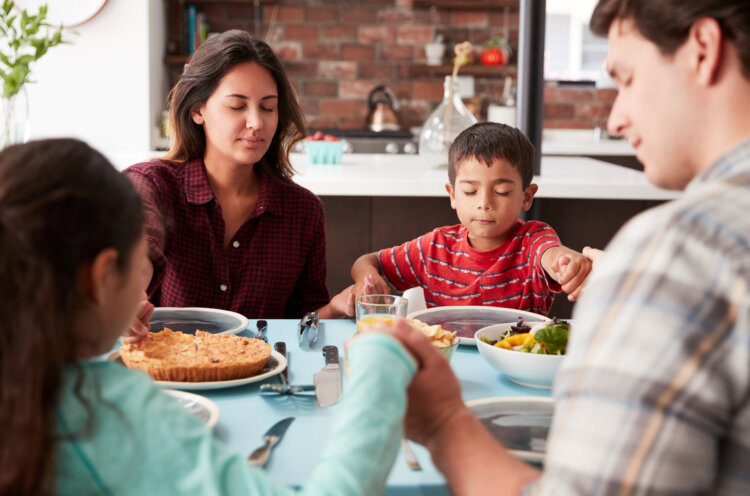
You know that famous Norman Rockwell painting titled “Saying Grace,” where an old lady and her little boy bow their heads in prayer before their meal in front of a couple of bemused teenagers smoking cigs and drinking coffee? Well, I’m that old lady during Thanksgiving. The cocky teens are my family. The little boy is like…well, I don’t know, because nobody else besides me wants to say grace.
While I’m not very religious, I do take pleasure in pausing for a moment now and then to indulge in a formal communal display of gratitude. I have a blessed life and feel it’s important to express how thankful I am for it. I won’t insist on naming names like “Jesus” or “God” or “Lord” when giving thanks. We don’t need to hold hands around the table. I don’t expect anyone to join in. And it won’t take me more than a minute or two. I’d even settle for the quick and non-religious Japanese custom of saying itadakimasu, which means “I humbly receive” or the no-frills Korean jal meokkesseumnida, which translates to “I will eat well.”
My feelings around grace coincide with a slim majority of Americans. A 2017 Washington Post poll found that 51 percent of us say grace year-round and the numbers are equally divided among rural and urban families and across many religions.
But, for some reason, over the twenty-something years of Thanksgiving dinners, it has never happened among my in-laws. I am a mostly lapsed Catholic who struggles with my faith and I married into a family of highly secularized Jewish, atheist, non-conforming, food-centric folks. They are loving, fun, generous, wise, and kind, but their idea of high ritual is singing Happy Birthday before cutting up the cake. When it comes to either chowing down or praising the Lord, eating wins hands down. The idea of bowing their heads and communing over a moment of silence or prayer doesn’t seem to cross their minds. It’s like asking a super shy person to dance. Just no. Too awkward. When I raise the possibility of saying grace with them, there are some here-we-go-again smiles, a few jokes about being grateful for the existence of Frank Reynolds in It’s Always Sunny in Philadelphia or the family guinea pig. But it never gets more sincere than that.
I understand. For people who aren’t used to it, saying grace can be uncomfortable. I, too, feel that sense of vulnerability, of self-consciousness when offering thanks to an invisible something. But, I’ve always felt that it’s that kind of collective surrender that brings family and friends closer. Besides, there’s no one way to do Thanksgiving. As one academic journal dryly puts it: “Thanksgiving Day ritual is guided by no written liturgy; the details of its celebration, like the past and future, are actively negotiated among participants, and not always harmoniously.”
Let me be clear. I’m no zealot and could probably use assertiveness training when it comes to asking for what I want. If I don’t feel the crowd’s with me, I demur. Last Thanksgiving, however, I decided to give it a real try at my sister-in-law’s home in Massachusetts. My husband kindly announced that I wanted to say grace. Feeling awkward, my heart pounding in my chest, I pulled out a prayer that I had written and read it in a quivering voice. It was ecumenical but sincere and came deeply from my heart. When I looked up at the end, every face was blank. Two seconds later, forks and knives were digging in without a word. Though I wasn’t expecting them to be awestruck or converted, I had hoped, however, for perhaps an “Amen” or “good job” or “that was nice.” Instead, it was as if I had just provided them with a summary of my bowel habits or my latest score in ping pong. There was simply nothing more to say. Here were the smartest, closest and most loving members of my family who I am sure would do anything for me in a time of need, but they were at a loss for words at that moment.
In all fairness, I must point out that my side of the family isn’t much better. I don’t recall saying grace at Thanksgiving during my childhood. It was rare that we were even all seated together at the same time. My older sister’s idea of Thanksgiving dinner as of late is a platter of sliced turkey from Stop-n-Shop and a few sides from Wawa. Though she’s a churchgoer and loves novenas and rosary groups, my sister’s never been one to organize prayers before meals. Sometimes it feels like she’s doing the dishes before the butter melts on my sweet potato. If we were to actually stop to pray, it would feel kind of “cringey,” as my daughter would say. It might have something to do with the fact that in my blood family, we rarely kiss or hug either and very rarely say “I love you.” Weird, I know. All of those outright manifestations of affection elude our sensibilities, though we are close in many other ways.
An informal survey of my friends reveals I probably won’t be finding my prayer group among them either. My friend Lyn points out, “Thanking the Lord, a semi formal Grace is far too ‘Bless me Lord for I have sinned…’ for my liking.” Leigh reports that her dad would count his blessings for each child with a kind of backhanded compliment such as “I’m thankful to Boo [her family nickname], who made the cheerleading team. And with that loud mouth of hers, how could the Tigers ever lose?!” Nevertheless, she felt acknowledged and loved by the attention.
My 18-year-old son is an unrepentant atheist, endlessly fascinated by his mother’s catechistic childhood and her acceptance of the dogma hook, line and sinker. He could indeed be one of those rough and tumble teens in the Rockwell painting, staring at his devout mother and mumbling a WTF. My daughter, the feminist, barely tolerates the patriarchal structure of the Abrahamic traditions. I am, therefore, left to my own devices, my own whispered intercessions.
This Thanksgiving, I’ll be in Bed-Stuy, Brooklyn, with another sister-in-law and her family. My expectations about saying grace in that setting aren’t high, but I’m going to give it one last try even if it’s “Rub a dub dub, thanks for the grub.”
I’ll let you know how it goes. Wish me luck or better yet, say a prayer for me.


Grok Nation Comment Policy
We welcome thoughtful, grokky comments—keep your negativity and spam to yourself. Please read our Comment Policy before commenting.